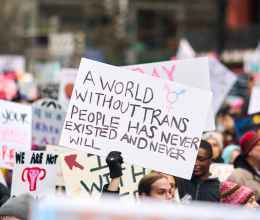
Courtney Phillips, a transgender woman, fended off daily threats when she was housed with men at the D.C. Jail from August 2020 until November 2021. "The staff there are not trained properly to deal with trans issues,” she said, “So, I had to do a lot of navigating and trying to figure out who’s who and what’s what.” Without help from staff, Courtney was on her own and had to be “mindful of how you interact in that space because you could just be yourself, and it could trigger someone.” She remembered being housed with a man whom she tried to avoid, “But every week there was an instance where he would be triggered by something that I did or said that would cause him to just blow up on me.” Even in her cell, Courtney had to protect herself from sexual and physical threats because men knew how to force open her poorly secured door. Courtney recalled that being a trans woman housed with men “put me in a state where I was always in defense mode and, for me, that wasn’t healthy.”
When Courtney was first booked at the jail, she told staff that she wanted to be moved immediately, but she remained in the men’s unit for a while, before eventually being placed in the women’s unit. This gender-appropriate housing made all the difference. “The females gave me the freedom to actually be me and to live in that space freely without the threat of violence, without the threat of being sexually abused,” she said. “I think if I was given the option to be housed as a female as soon as I came in, I believe that my experience would have been better.”
Trans women like Courtney will now be clearly offered this option, thanks to a recent settlement of Sunday Hinton’s lawsuit. The ACLU of the District of Columbia and the Public Defender Service for the District of Columbia (PDS) filed a lawsuit on behalf of Sunday Hinton after the D.C. Department of Corrections (DOC) forced Ms. Hinton, a transgender woman, to live in a men’s unit for more than two weeks in May 2021. DOC will now ensure that trans people are housed according to their gender identity upon intake. DOC will also now end its practice of shackling all “protective custody” residents, including trans people, while they are being transferred or moved within the jail. The settlement, reached in March 2022, will make significant safety improvements for trans residents of the jail, so that, as Ms. Hinton said, “other trans people at the jail will be treated with more dignity.”
Experiences similar to those of Ms. Hinton and Courtney have played out across detention facilities in the United States. The federal Bureau of Justice Statistics reported that, between 2011 and 2012, a staggering 40 percent of trans people in U.S. jails and prisons reported being sexually assaulted. Black trans women have also been over-criminalized. The 2015 U.S. Transgender Survey found that Black trans women were ten times as likely as the general U.S. population to have been incarcerated between 2014 and 2015.
After her experience being incarcerated, Courtney is committed to spreading the word about trans people’s rights at the D.C. Jail. She wants “trans people at the jail to know that they have the right to be housed where they identify and to be able to live without the threat of violence or sexual assault.” You can learn more about Ms. Hinton’s settlement here.

